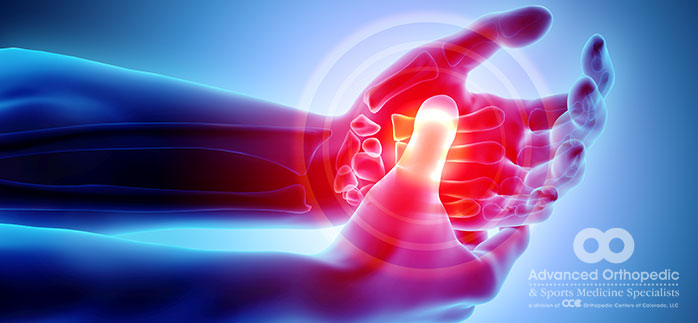Nerve Pain in Your Hands? Common Causes and Treatments
Nerve pain in your hands can keep you from many important daily tasks. From texting and typing, to eating, grooming and sometimes even writing (yes, with a pen – people still do it!), healthy hands are, at once, remarkably efficient and incredibly vulnerable.
The hands’ complex structure is the root of both of these traits. Your hands are a collection of bones, joints nerves and tendons that, when functioning properly, put the world at your fingertips. However, when nerve pain in hands interrupts their remarkable efficiency, it can turn your life upside down. If you have frequent pain or numbness in your hands you already know this all too well.
There are numerous factors that can cause numbness, tingling or nerve pain in hands or fingers including various autoimmune diseases, diabetes, or inflammation but one of the most common sources is a pinched nerve. Frequently, nerve pain in the hand or wrist is a result of overuse or trauma. Falls, car accidents and work injuries are common causes of hand and wrist nerve injuries. When a nerve receives too much pressure from the adjoining tissue (i.e. bones, muscles, tendons), pain, tingling or numbness ensues.
Who’s at risk for nerve pain in the hands?
Gender, weight, overuse and motion repetition are among the factors that increase the risk of nerve pain in your hands or wrists. Women have smaller carpal tunnels and are more susceptible to carpal tunnel syndrome. Both excess weight and overuse can lead to increased risk of pinched nerves.
What are the symptoms of nerve pain in hands?
Your hands can perform a complex range of motions. When that motion is impaired or one of those actions – such as flexing your wrist, thumb or finger – is lost, the culprit may well be nerves in your hand or wrist. Numbness, tingling, weakness and pain are other indicators that nerve function is being impaired and it’s time to see a specialist.
Identifying the cause of the loss of motion or source of pain is best revealed through a physical exam and potential tests such as an x-ray, MRI, ultrasound or CT scan. Your orthopedic specialist will determine the best diagnostic tools after a physical exam.
What are my hand nerve pain treatment options?
Just as the origins of hand pain are diverse, so too are treatments for the wide range of conditions. For many, conservative treatments such as rest and ice may offer relief within days or weeks. Often, lifestyle changes like adjusting typing posture, taking breaks or limiting the frequency of specific activities can have a significant impact. When conservative solutions aren’t enough, medications or physical therapy can help. More severe nerve injuries or symptoms may require surgery.
Nerve pain in the hands can have a major impact on your day-to-day life, including the ability to work, exercise and take care of family so don’t ignore symptoms. Early diagnosis of hand and finger numbness provides more opportunity for positive outcomes with both surgical non-surgical solutions. Schedule an appointment with one of our hand and wrist specialists today. advancedortho.org/hand-elbow-and-shoulder-disorders/










